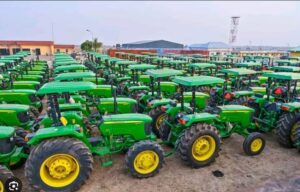
NIRSAL trains 355 agents, 706 wheat farmers in Jigawa
By Umar Akilu Majeri, Dutse
Nigeria Incentive-Based Risk Sharing System for Agricultural Lending (NIRSAL) Plc in partnership with the Jigawa State government has trained 355 agents, 706 wheat farmers in Jigawa.
This is in a bid to deepen collaborations with the Federal Ministry of Agriculture & Food Security and support the food security agenda.
During the training, a total of 355 extension agents and 706 farmer cluster leaders from Kiyawa, Birnin Kudu, Ringim, Hadejia, and Kazaure took part in the first phase of the training sessions, which were held in four of the five emirates in Jigawa State.
The participants are expected to transmit the knowledge gained along with the training materials received to the members of their respective clusters.
Speaking on the importance of the training exercise, Abbas Umar Masanawa, OON, Managing Director/CEO of NIRSAL Plc said, “The Federal Government has done precisely what it should. It has communicated its vision for food security in Nigeria, provided leadership, and is committing resources to back its vision.”
“On our part, we are showing our readiness to support Jigawa State, and all other states, to walk the talk of the government. We are contributing our expertise by preparing these extension agents and farmers to make success out of this collective endeavour for Jigawa and Nigeria’s sakes.”
He added that NIRSAL Plc does not intend to stop at capacity building alone.
The first module in its capacity building package focused on Group Dynamics, with NIRSAL expecting the Project Implementation Committee and Extension Agents to adopt a geo-cooperative approach to cluster formation.
The participants were also taught to effectively produce aggregation as a critical success factor.
Also included in the modules for the training program is a deep dive into possible protocol breaches and the early warning systems put in place to address them.
The leader of the delegation of trainers from NIRSAL, Mr. Ibrahim Suleiman, noted that optimal value capture at the farm level is fundamental to the process of obtaining and repaying loans.
“Once that is guaranteed,” he said, “other processes leading up to value addition and sale can be controlled efficiently for the determination of profits, sharing of the same, and the prompt repayment of loans.”
Other than the Federal Ministry of Agriculture and Food Security and NIRSAL Plc, the Jigawa State Government is also collaborating with the African Development Bank, Flour Mills of Nigeria Plc, and some Super Agro Dealers supplying the inputs.
The State Commissioner of Agriculture, Muttaka Namadi, is keeping tabs on all collaborators, managing relationships, and supervising performance.
The Commissioner in his remarks commended NIRSAL for its commitment to the Jigawa Wheat project, counting on the support to lead to the success of the project.
Similar sentiment was expressed by the participants of the capacity development program who attested that the program gave them new insights for their work.
NIRSAL’s mandate is to stimulate the flow of affordable finance and investments into the agricultural sector by de-risking the agriculture & agribusiness finance value chain, fixing agricultural value chains, building long-term capacity, and institutionalising incentives for agricultural lending through its five (5) strategic pillars, namely: Risk Sharing, Insurance, Technical Assistance, Incentives and Rating.



